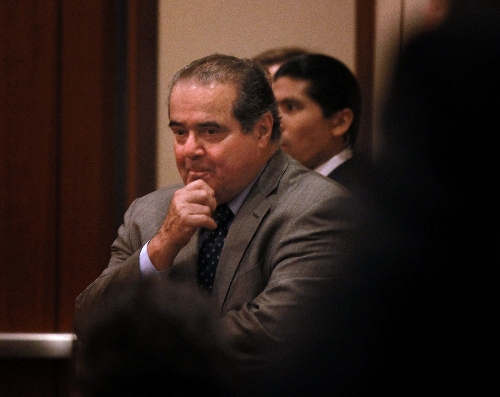Scalia tells audience at UNLV he’s ‘proponent of originalism’

U.S. Supreme Court Justice Antonin Scalia described himself as “a proponent of originalism” Wednesday during a lecture to law students and faculty at the University of Nevada, Las Vegas.
“Originalism was orthodoxy until about the middle of the 20th century,” he told the Boyd Law School crowd. “Every judge purported to be an originalist.”
Scalia, 76, said that originalism “gives the text that meaning which it had when it was adopted.” But the high court and lower courts, he lamented, have gotten into the habit of thinking the Constitution morphs, that “it doesn’t necessarily mean today what it meant when it was adopted.”
The conservative justice said he hates the term “living Constitution.”
“The Constitution is not a living organism,” he said. “It is a legal document, and it means what it said at the time.”
It is not a new viewpoint for Scalia, who has long expressed his support of originalism. Former UNLV law professor Carl Tobias, who now teaches at the University of Richmond, said Scalia had a similar theme when he lectured at the Virginia law school about two years ago.
“He’s engaging. He’s funny,” Tobias said. “He’s very smart, very quick.”
Scalia frequently drew laughs Wednesday while addressing about 150 students and faculty members in the Thomas & Mack Moot Courtroom. Although still photographers were permitted during the “first minute or two” of the lecture, according to guidelines given to the news media, he quickly grew impatient with them.
“That’s enough. Enough cameras. Thank you,” he said shortly after starting his lecture. “Last one. Bye bye.”
Later in his talk, Scalia said cases involving the question of what constitutes cruel and unusual punishment most clearly reflect the attitude of those who believe the Constitution is a living document. For them, the answer to that question changes with time to comport with “evolving standards of decency.”
But the framers of the Constitution did not share that attitude, he argued.
“Why did they adopt a Bill of Rights? Why did they adopt a cruel-and-unusual-punishments clause?” Scalia asked. “Precisely because they worried that a future generation would not be as wise, or as kind, or as virtuous as they were.”
According to the Eighth Amendment, “Excessive bail shall not be required, nor excessive fines imposed, nor cruel and unusual punishments inflicted.”
Scalia said people think a living Constitution always will lead to greater freedom. But he said his court has used the concept both to add rights and to eliminate old ones.
“The living Constitution is a two-way sword,” Scalia said.
Scalia answered several questions Wednesday after his lecture, including one from second-year law student Geordan Logan.
Logan, 45, later said he has read many Supreme Court opinions in law school. He agreed with some, while others triggered “violent reactions” within him.
“Most of the violent reactions have been to Justice Scalia’s opinions,” Logan said after the lecture. “That being said, I often find myself agreeing with some of the points in his dissents or his opinions. I just feel he takes them too far.”
Nevertheless, Logan said he respects the way Scalia writes his opinions and was “thrilled” to hear him speak.
“I appreciate his intelligence, but I still believe he goes too far,” the student said.
Scalia was nominated for the Supreme Court by President Ronald Reagan and took his seat in September 1986.
He was not the first U.S. Supreme Court justice to speak at Boyd Law School.
Justice Anthony Kennedy was the keynote speaker in September 2002 during a dedication ceremony for the law school’s new facility on the university campus.
This year, Kennedy visited the school on May 1 while participating in events for Law Day.
Contact reporter Carri Geer Thevenot at cgeer@reviewjournal.com or 702-383-0264.












